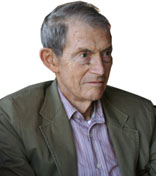David Stadler - Professor, emeritus of Genome Sciences, University of Washington
 Current
studies in Stadler's laboratory are concerned with the mechanisms of mutation
and recombination in Neurospora. The mtr locus controls a neutral-aminoacid
permease, and mutants at this locus can be selected by resistance to inhibitory
analogs of neutral amino acids, like fluorophenylalanine. Revertants of
mtr mutants can be selected on media on which uptake of a neutral amino
acid is required for growth. This two-way selection system has enabled
Stadler and his colleagues to make detailed studies of mutation at this
locus. The mtr gene has been cloned, permitting them to make a molecular
analysis of the mutants.
Current
studies in Stadler's laboratory are concerned with the mechanisms of mutation
and recombination in Neurospora. The mtr locus controls a neutral-aminoacid
permease, and mutants at this locus can be selected by resistance to inhibitory
analogs of neutral amino acids, like fluorophenylalanine. Revertants of
mtr mutants can be selected on media on which uptake of a neutral amino
acid is required for growth. This two-way selection system has enabled
Stadler and his colleagues to make detailed studies of mutation at this
locus. The mtr gene has been cloned, permitting them to make a molecular
analysis of the mutants.
They are monitoring recombination in crosses of mtr mutants for which
they have precise molecular information. This will permit them to answer
several basic questions about the properties of recombination: 1) What
is the relationship of exchange frequency to the distance between the
segregating sites? 2) What is the relationship of exchange to gene conversion?
3) What is the length of the segment which undergoes gene conversion?
4) What is the effect of heterology on the frequency of recombination?
Excerpt from the interview:
Prasad: How you become a serious student? What happened that made you become a serious student?
David: I got married and I guess that may have been part of it! And that become a pattern long after a got married. I went to graduate school I majored in biology because I wanted to be an academic. I like, I love the academic scene that I grown up in and I wanted to be part of that and I like science, and I wanted to be in science. I like social sciences and I felt I would like to do something that contributes to the betterment of man and I thought maybe there was a better chance in doing that in social sciences then in casual science. But on the other hand I had the impression that most of the social scientist that I knew and I admired, tended to be misunderstood by society, and not appreciated and usually not successful in really changing the welfare of man very much. So I thought that a career in social sciences might be very frustrating
There was natural science… that I felt was a more honest measure of accomplishment. And I think that was why I decided to go to graduate school in biology. I liked biology. But I didn’t plan to major in genetics. And the reason that I didn’t is because I thought I was following blindly in my father’s footsteps enough by just going into academic biology. And I just when I wanted was reach a level of initiative of my own and I thought I need to be in a different branch of biology. So I sort of liked I liked physiology.
I went to Princeton graduate school with the idea that I would study social or physiology . There was a man there named Harvey who was famous in that field… turned out that he was old man about to retire and didn’t appeal to me much because so far I had worked with younger people. But the work I did there, umm, you know, I took on my interest somewhat when I was there, wasn’t a very exciting problem and umm I worked on the chemical profusion and the growth of the mole Germs. Which direction germs grow is a powering chemical gradient. I tried to study that problem in a particular portion in a particular mole. So when I went to Caltech as a post doc next year with my new bride I applied for post doc because there was a group there that worked with the mole neurospora. They did genetics on nurospora and I thought I could work with the chemical profusion and neurospora and physiology might, you know, be aged by knowledge of genetics. I thought I was going to be in physiology working with genetics.
I got to Cal Tech morning in Sept 1952. The night before we arrived, we arranged to use the apartment of a grad student, that was away for a couple of weeks visiting his family. Next morning I went into Cal Tech, and went in to introduce myself to Professor Beetle the chairman and he talked to me for just a minute then took me across the hall to Prof. Horowitz, one of the junior assistant professor. And Norman Horowitz asked me, “And tell me something about what you have been doing” I talked for about twenty minutes about chemical profusion and he listened politely but I don’t think he was very interested. Finally when I paused long enough for him to get a word in edgewise, he says, “Well since you are here, why don’t you work on something we know something about.” That was the moment I become a geneticist.